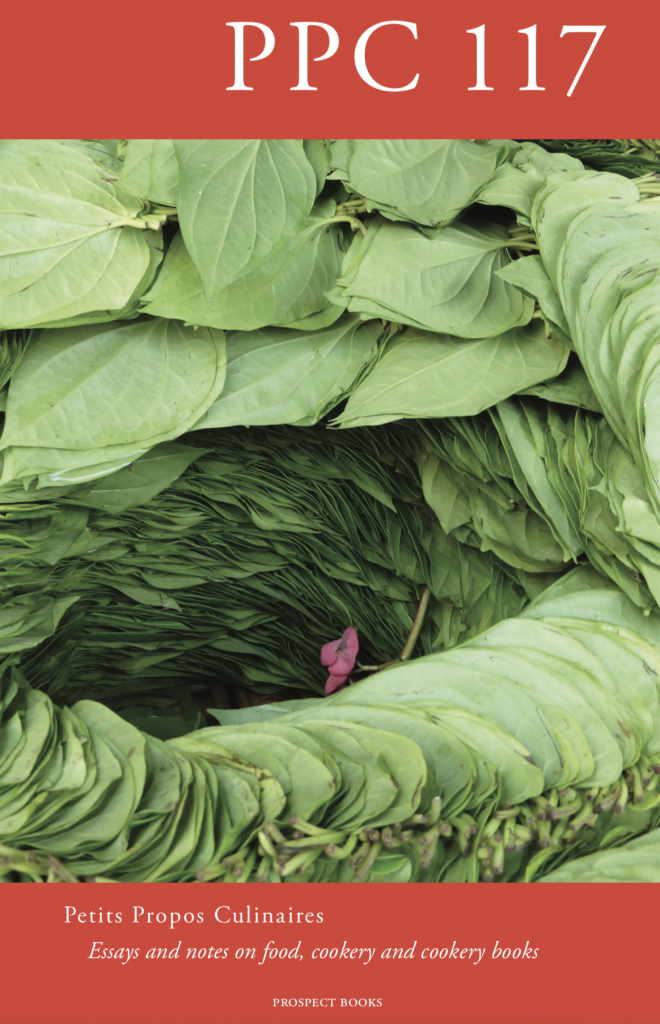Description
PPC 117 (July 2020).
Our current issue of Petits Propos Culinaires will have you reaching for your deepest cooking dish, as you explore Charles Perry’s sourcing of 162 recipes from the thirteenth-century Syrian Cookbook, Kitāb al-Wuṣlah ilā l-Ḥabīb
Original recipes are given by Charles Perry, culinary ones as well as a number of medicinal recipes. You will find versions of stuffed crepes, some wrapped in delicate marzipan, yoghurt flavoured meat stews and plum stews.
Mary-Anne Boermans takes us to Marybone Gardens, as Marylebone Pleasure Gardens were called in the 1750s, where Miss Trusler took over her father’s bakery, producing rich Seed and Plumb Cakes, Christening Cakes and sixpenny Mince Pies. But who was Miss Trusler? And how did the famous cheese filled Maid of Honour cakes come about, which can still be found in the cafe of that name near Kew Gardens?
More topically, Tenille D. Faison gave us her article on Vitamin K, Dutch cheeses, and COVID-19. An extract is below.
CONTENTS
The Ṣinā‘ah 74 Miscellany
Charles Perry
Maid of Honour: Britain’s First Celebrity Baker
Mary-Anne Boermans
The K2 Effect on American Health
Tenille D. Faison
Banquets with the Viziers: Diplomats and Scholars in Constantinople, 1544–1554
Andrew Dalby
An Ode to the Humble [?Healthy] Pizza Pie
Dawn Starin
Myanmar Citrus. An Addendum to ‘Asian Citrus’
Phil Iddison
More on the Gudgeon
William Sayers
Magic Bread
Don Peterson
Book Reviews
from The K2 Effect on American Health Tenille D. Faison
The American diet and cheese –
In America, millions of people consume processed foods on a daily and weekly basis; foods that were originally created after the Industrial Revolution. Such processed foods lack the essential vitamins and nutrients that keep the body strong and aid in fighting against disease and chronic illness. In turn, many Americans become sick and run to the doctor hoping for a cure, but they merely receive a short-term treatment for a condition that could have been avoided, in many cases, if they simply had a better diet. In addition, the medications prescribed by doctors to treat such conditions often create negative health effects, some even causing cardiovascular decline. As if this were bad enough, many Americans, otherwise apparently healthy, resort to various dietary supplements in the belief they will improve their resistance to disease. But there are many supplements that are not good for the body and can cause further damage. This is because these synthetic forms of vitamins and minerals cannot be absorbed by our bodies in sufficient quantity to support the immune system’s proper functioning. In the final analysis, many Americans are not as healthy as they may think they are, and this at a time when there is a serious COVID-19 pandemic occurring. Even if a person is not harbouring coronavirus, nor demonstrating any other symptoms of sickness or disease, that person may still not be in a good state of health!
Consequently, health experts, the government, and the American people must now closely examine the American diet and look for better ways to improve their health. It is to be applauded that many experts do recommend a Mediterranean diet, which does support good health (Renna et al., 2015), but many experts still support a diet that is largely plant-based, largely carbohydrate-based, and promotes the message that fats from meats and dairy are bad (Skerrett & Willett, 2010). It is wrong to assume that a diet void of fat is good, particularly in the case of vitamin K2 because vitamin K2 from meats and cheese cannot be absorbed without the presence of a hydrophobic fat environment (Halder et al., 2019). This is because this kind of vitamin is fat- soluble (Halder et al., 2019). Therefore, it is imperative that we re-examine the kind of diet current in America and advocate regular consumption of Gouda cheese, in moderate quantities, in order to maintain a daily intake of vitamin K2. However, caution is still warranted for those who are lactose intolerant or have dairy allergies (Joseph, 2019). In these cases, very low amounts of Gouda cheese consumption may be tolerated by the body.


